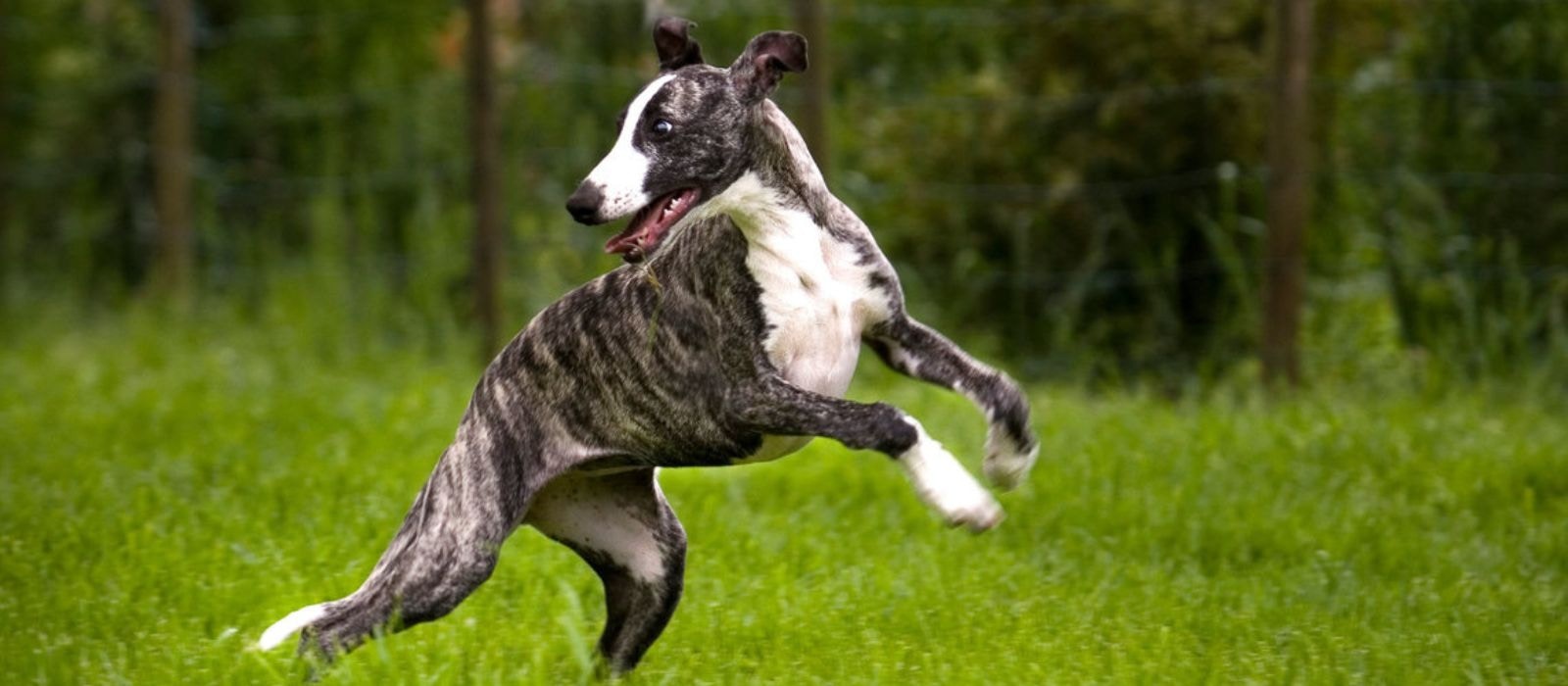
Whippet breed characteristics
- Size: Small
- Traits: Sweet. Shy. Placid.
- Maintenance: Low maintenance, weekly brush, no/minimal hair clipping required
- Best Suited To: Families
- Lifespan: 12 to 15 years
The willowy Whippet is a sweet dog with oodles of love to share with its owners. From walks down the street and backyard play with the kids to playful fun at the dog park, Whippets are lovely, friendly additions to family life. If you are seeking a wonderful house pet and perfect snuggle buddy, you should seriously consider choosing a Whippet.
Where I'm From
The Whippet originates from England where the breed are thought to be the descendants of small Greyhounds that were unfit for hunting large prey. Subsequently the dogs were bred and perhaps interbred by peasants to hunt small prey like rats, rabbits and hares. Whippets also became successful racing dogs in the nineteenth century and remain the fastest accelerating dogs in the world as well as the quickest for their weight category.
The breed was officially recognised for the first time in England in 1891.
What I Look Like
Whippets are medium-sized, slender dogs that look very similar to their much larger Greyhound cousins in a more petite frame. They have a shorthaired and smooth coat that becomes glossy with weekly brushing. Whippets come in black, white, fawn, brindle and blue, and also come with varying combinations and colour patches.
How I Act
Whippets are beautifully natured, gentle dogs that are a great fit for family life. Though they do not make great friends with cats or other small animals that will evoke their hunting instincts. They need to be leashed when outside the house and require a well-fenced backyard area that will prevent any attempted escapes in chase of prey.
Whippets can be challenging to train and require a patient hand. They are sensitive creatures and need consistent training with food or praise rewards. Whippets don’t react well to harsh scolding, which can cause them to withdraw. Whippets also need to be socialised from a young age to ensure they don’t become overly timid with other dogs or people.
Though Whippets are quick racers they don’t requires oodles of activity, a daily 30-minute walk or a run with some canine pals will do this dog just fine. They are also rather content to cuddle up on the couch alongside their doting owners.
Looking After Me
Whippets require a good quality dry dog food meal twice a day as per packaging instructions.
They shed but only a minute amount. They need a weekly brush and the occasional bath if dirty.
Whippets are thin dogs with not a lot of fur to shield them from cold weather. As such, they require a comfortable bed and possibly a doggie coat when the weather cools.
They love the company of other dogs, even another Whippet, and do well in multi-dog homes, which will help prevent any loneliness during daytime hours when family members aren’t home.
Whippets are generally very healthy dogs with few medical issues of concern. However, some things to look out for include sensitivity to anaesthesia, eye diseases and the blood disorder von Willebrand’s Disease.
It is advisable to check the temperament and medical history of a puppy’s parents and view veterinarian clearance certificates to ensure you get a healthy dog though not every ailment can be predicted. Be very wary of uncertified backyard breeders.
Pros
- Whippets have lovely, docile temperaments and are a great choice for families with children, even young ones with whom they will play gently. Though as with all dogs, Whippets should always be supervised when around children.
- Whippets are quiet dogs that rarely bark, which makes for a great neighbourly pet. However if you are looking for a guard dog, Whippets are just to friendly to be of any security use!
- Whippets are low shedders so there isn’t too much dog mess to clean up after.
Cons
- Though Whippets are good with other dogs, they have a strong hunting instinct; as such they are not good fits for homes with cats or other small pets, which they could injure in chase or even kill. Early socialisation and training will help with this trait but still Whippets should not be left alone with the household cat.
- Whippets need to be walked on a lead or they may run off for kilometres in pursuit of a tantalising scent.
- Whippets can become shy of strangers and other dogs if they are not socialised sufficiently.
